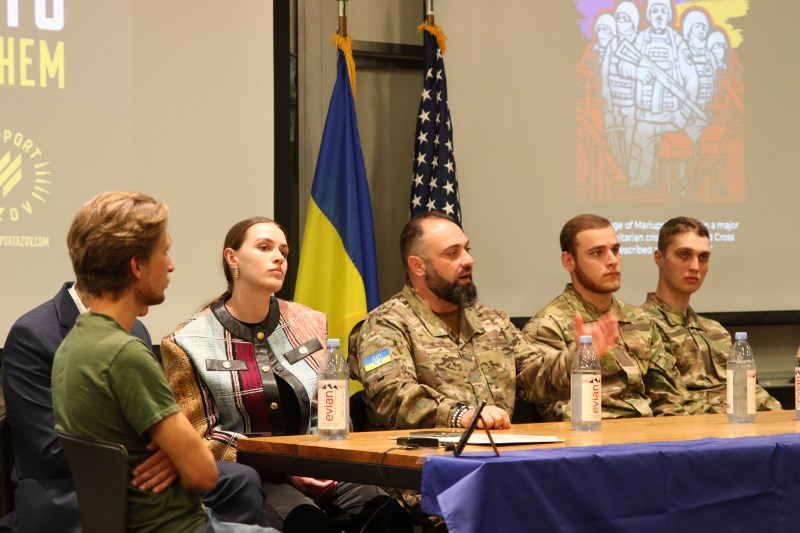Two Ukrainian soldiers held as prisoners of war (POWs) after the invasion of Mariupol called for support in the war against Russia on Friday.
Between the moments of mourning and reverence, the event was full of joy, laughter and connection among the Ukrainian community. Several families with young children were in attendance, and some attendees brought flowers and flags for the speakers. Many wore Ukrainian-flag-colored accessories, T-shirts with slogans supporting Ukraine, flower crowns and bright-colored traditional clothing.
Artur Lypka and Vladyslav Zhaivoronok were released from Russian captivity in a POW exchange this summer. George Kuparashvili, who also spoke, was wounded and evacuated from a steel plant in a helicopter rescue. At the event, the soldiers recounted some of their experiences during the Russian siege of Mariupol, a coastal city in Ukraine with a population of around 500,000.
“For me, it was not a film, it was not a video on YouTube,” Zhaivoronok said through an interpreter. “It was parts of bodies of civilians; it was burning not houses, but blocks of the city.”
Zhaivoronok said that when he was injured the first time and went to the hospital, a 16-year-old girl died in his arms from a landmine. Zhaivoronok now wears a prosthetic leg.
The speakers repeatedly said that Russia has violated the Geneva Conventions during its war with Ukraine. The Geneva Conventions are a set of international agreements established after WWII to protect civilians and POWs.
“Just imagine if Ukraine loses,” Zhaivoronok said. “It would not mean just to lose Ukraine as my motherland. It would mean that any international agreements, any international conventions, any international laws do not work.”
“Ukraine is a gate,” Kuparashvili added, referring to the theory that Russia will continue its aggression in other countries. “If it falls, that’s it.”
The speakers also called for the release of other Ukrainian POWs. Yulia Fedosiuk, who also spoke at the event and is the wife of Arseniy Fedosiuk, a POW still in Russian captivity, said that she has been unable to get in contact with her husband for months, with no information on his condition or location.
“They have defended us, and now we have to rescue them,” she said.
The prisoners of war were members of the Azov Regiment, which has drawn praise for its defense of the Ukrainian city of Mariupol but also received criticism online for what some allege are historic ties to the far right. The regiment has also received criticism for its symbol, which bears a resemblance to the wolfsangel, a symbol used by the Nazi party.
Kuparshivili, who co-founded the regiment, said that the association is coincidental and that the symbol is an “N” and “I”, for “National Idea.” He denied any current association with the far right and said that any extremists in the regiment were removed when the group joined the Ukrainian National Guard. Though officially part of the Ministry of Internal Affairs, members of the National Guard can be mobilized during wartime.
“We had some people of course with a different subculture, different ideas, different visions,” Kuparashivili said. “We’ve just cut these people off. So it was a few of them.”
Bohdan Kamets, who organized the event with the Ukrainian Students Association, wrote in an email that the regiment has been targeted by Russian propaganda, including allegations that the group has ties to Nazism, in order to legitimize the war against Ukraine.
“The citizens of Ukraine with different ethnic, religious, and socioeconomic backgrounds and members of the LGBTQ community make up this Regiment which is incompatible with any interpretation of the term ‘Nazi,’ he wrote. “Their ultimate goal is to defend Ukraine from the genocide that Russia is committing on Ukrainian soil.”
Michael McFaul, Freeman Spogli Institute for International Studies director and former United States Ambassador to Russia, entered the auditorium to loud cheers during the audience question-and-answer period.
“You have many friends of Ukraine in our community,” McFaul said. “We are grateful to be honored with your presence.”
Members of the audience expressed admiration for the soldiers, including members of the Bay Area Ukrainian community.
Nevidoma Tetiana, who immigrated to the U.S. from Ukraine 11 years ago, said the event gave her hope.
“We have to continue,” she said.
Also in attendance was Yuliia Lozko, a visiting scholar from Ukraine who is completing a residency in radiation oncology at Stanford.
“I just feel like, oh my god, I’m so proud,” she said. “I just really want to honor them. I just really want to speak to them and say thank you.”
Looking forward, Kufarashvili said it will be important to treat the mental and physical wounds of former Ukrainian soldiers.
“Give them chances to rebuild, to be useful again,” Kufarashvili said.
Kamets told The Daily after the event that he has friends serving in the war, including a friend who was recently exchanged in a prisoner-of-war swap.
“We need to fight this fatigue in American news,” he said. “Every moment when we do nothing, or we think that we tired of this activism, there’s someone who’s losing their life to protect the democratic world and free world from these aggressors.”
This article has been corrected to reflect the accurate spelling of two of the speakers’ last names as well as that Kuparashvili is not a freed prisoner of war. The Daily regrets this error.
